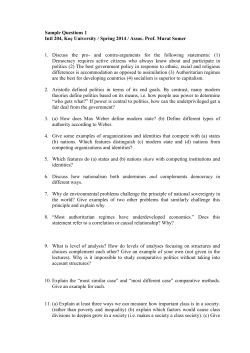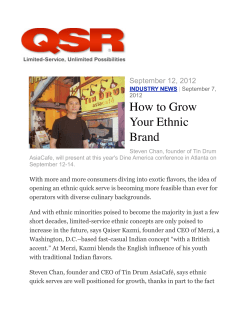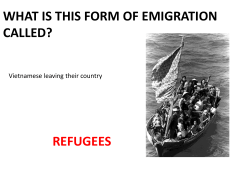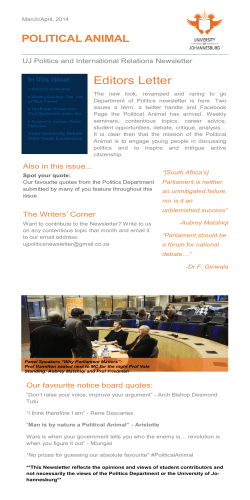
Aspects of European Political Culture: Introduction
Aspects of European Political Culture: Introduction By Shai Moses and Dagmar Kusá It is with great pleasure that we present you this collection of texts. This publication is one in a series of studies by the Junior Visiting Fellows of the Institute for Human Sciences (IWM) in Vienna that come to the Institute from various academic disciplines for half a year long fellowship. The aim of the IWM is to allow young researchers to work alongside senior researchers in a diverse and progressive environment. This publication captures the wide scope of interests that researchers share at IWM. This volume is organized around a broader understanding of the subject of political culture, defined as a set of norms, values, attitudes, spiritual, and emotional features of a society or a social group, that are related to the distribution and utilization of power in or among societies. General aim of this collection is to examine selected aspects of political culture in relation to economic, social and historical components of the (mostly Eastern) European societies. Reader will have no difficulty finding his or her way through the texts. The volume begins with an article from a broader, philosophical point of view, emphasizing ethics of human rights as a culture of thinking. It is followed by an article that examines in comparative perspective how political and economic cultural values contribute to the Central and Eastern European Countries’ economic convergence to the EU. In the third article we begin descending to a micro - level examination, looking at a case study of an Austrian imperial bureaucracy attempt to transform Galicia during the second half of the eighteenth century. After that, we move about 150 years ahead to discuss the nationalist right under communism in Poland. We end the manuscript with two articles addressing the role of the historical and political memory in Central Europe. The first examines the politics of city-image in contemporary Budapest, while the second follows usage of historical memory and historic amnesia on the Slovak political scene. 4 All the papers have abstracts attached. For a matter of convenience, we aggregate them together and present them below. Sophie Loidolt. Notes on an Ethics of Human Rights: From the Question of Commitment to a Phenomenological Theory of Reason and Back. One of the challenges for our culture is how to think human rights in a way that does not fall pray to cultural relativism, but remains open to intercultural dialogue and alert to historical contingency. This is why we need an ethics of human rights as a culture of thinking for which this paper will try to outline two basic threads. Loidolt will focus on man not as the bearer of human rights but as the being that can adjudge (zusprechen) and constitute ‘right’ at all. Hence, Loidolt will rather concentrate on human accomplishments and responsibility than on human needs. The philosophical background of the argument is a phenomenological one. With this approach Loidolt will try to embrace both a universal, transcendental level and a level of cultural awareness that tries to face the other as other. In this approach, universality remains something aspired after that keeps being constituted from the outside and that asks for a practical performative attitude. Shai Moses. Operationalizing Political and Economic Culture in Eastern Europe. The completion of the first wave of Eastern enlargement determined the European Union (EU) to become more heterogeneous in terms of living standards. All ten new Member States (NMS) are below the average EU’s GDP per capita. Furthermore, since the contemporary gap between the enlarged EU and the rest of Central and Eastern European (CEE) region is even greater in terms of living standards, questions of regional security and stability are already present. This short paper aims to shed some light on this subject through a comparative examination of some aspects of political and economic cultural competences that affect the economic convergence of Central and Eastern European Countries (CEECs) to the EU. One of the problems in dealing with economic culture and its effects on wealth is that it is a broad definition, and that it is not quite obvious how we can operationalize it. In response, Moses suggests narrowing the discussion to a particular aspect of economic culture, by examining specifically libertarian and entrepreneurial values. Arguments presented here are that the libertarian values, that is philosophical mindset that emphasizes the responsibility of the self and the maximization of liberty 5 for every individual, and in particular, the need for high economic and personal freedoms, do exist to various degrees in CEECs and have a significant impact on entrepreneurial values. The second argument is that these entrepreneurial values, as reflected in the support for competition, private business ownership and which put emphasis on innovation, do have a positive and significant contribution to CEECs’ convergence. Iryna Vushko. Enlightened Absolutism, Imperial Bureaucracy and Provincial Society: Austrian Project to Transform Galicia, 1772-1815. The paper analyzes the bureaucratic modernization of Galicia, the formerly Polish territory annexed to the Habsburg Empire in 1772. The attempted transformation of Galicia was part of a larger reform project of the second half of the eighteenth century, uniting an Enlightened spirit of centralization with the reality of Austria’s territorial enlargement. The Austrian bureaucrats were responsible for the integration of a new province into imperial structures. By focusing on the Austrian state bureaucracy and its interaction with local population – Poles, Jews, and Ruthenians (Ukrainians) Vushko analyzes the general transformation of Galician political culture through the late eighteenth and early nineteenth century. Mikolaj Kunicki. The Nationalist Right under Communism: Bolesław Piasecki and the Polish Communists, 1944-1979. Based on a doctoral research project, this article introduces to the readers Bolesław Piasecki (1915-1979), a prominent Polish nationalist politician. A fascist in the 1930s and a pro-communist Catholic activist in postwar Poland, Piasecki was the leading advocate of the reconciliation of nationalism with communism. By narrowing the scale of historical observation to an individual case, the article discusses the role of nationalism in twentieth-century Polish political culture, analyzes the entanglement of communism and fascism, and presents an example of the ideological affinity between communism and nationalism. It explores Piasecki’s postwar career against the background of the nationalization of the Polish communist party culminating in the 1967-1968 anti-Semitic campaign. It argues that under certain conditions, not only did the communists utilize nationalism, but – as Piasecki’s case proves – they also prolonged the existence of the nationalist right. In broader terms, Piasecki’s story points to the fact that the adoption of nationalism by 6 Eastern European communist leaders accelerated the ideological de-legitimization and erosion of the system in the region. Emilia Palonen. Constructing Communities: From Local to National, Transnational and "Activist" Politics of Memory in Europe. Within the European Union at least since the failed referenda on the EU constitution, there has been a strong realisation that nationalism has been strengthened in the European countries, even in Western Europe, which has been seen as the civilized counterpart of the nationalistic Eastern Europe. Palonen looks at the construction of political communities through processes of memory and the politics of memory. Palonen seeks to highlight that there are politics of memory on different levels of political community building, not only the national or the European federal level. This invites us to think forward the way in which the overlapping and competing levels of political memory – and not only the interaction between different groups or nations – have an impact on the memory processes and the articulation of key signifiers such as the nationhood or Europe. In the final instance, it should enable us to see how the multiplicity of levels is an ever-present issue, even if certain groupings and actors would want us to focus our collective imaginary, or the imagining of the collective, on only one level of political community. In this paper, Palonen will offer a brief look on the politics of memory at the European federal and national level, on the national and metropolitan level, on the metropolitan municipal and local district level, as well as lead the analysis towards the politics of memory in the activist - often anti-(state)-institutional - level. The last move highlights the existence of memory building in the activist communities, which shows the importance of memory for political communities, and the function as a creator of continuity and even institutional base. It also highlights the multi-level character of these memory projects and community, which are, crucially to their political character, not without conflict. Dagmar Kusá. Je Me Souviens…Historic Memory and Historic Amnesia in Central European Politics. Sixteen years after the wave of the revolutions that toppled half a century of communist rule in Central Europe Slovakia, Czech Republic, and Hungary are members of the European Union with fully consolidated democratic regimes. Yet their domestic political scenes are still split along the ethnic lines and 7 latent ethnic conflict is palpable within as well as across the borders. This paper focuses on one of the main factors that feed the continuing ethnic tensions in politics, and that is the manipulation with historical history by the political figures. National elites often use references to the events in ethnic groups’ past as ready-made weapons against representatives of other ethnic groups, or as a lure to attract voters within their own community. My research shows, that the level of awareness and interpretation of events and eras highlighted in historical memories of this or that ethnic group varies by nationality, but also by the function of belonging to the ranks of national or local elite. ‘Common’ people, simply put, seem to have more pedestrian priorities than linking ancient histories to current political squabbles. In this brief paper, Kusá looks at the theoretical background of ethnic mobilization under the elite leadership, and tools utilized to further political agendas, with a focus on the manipulation with historical memory. To deeper illustrate these tensions, a case study from southern Slovak town of Komárno is examined. The main aim of this publication is to foster collaboration and mutual understanding among researchers of very diverse backgrounds, brought together as Junior Fellows. We believe that the interdisciplinary nature of this collection will enrich our understanding of the societies we live in. Finally, over this semester, many people have assisted us in running our various projects. We would like to thank the members of the IWM staff. Although we cannot name them all, we owe special thanks to the Director of the IWM Suzanne Froschl, to the Fellows’ Coordinator Mary Nicklas, to the Network Administrator David Soucek, to the Public Relations Manager Sabine Assmann, and to IWM Permanent Fellows János Kovacs, Klaus Nellen and Cornelia Klinger. Shai Moses and Dagmar Kusá. 8
© Copyright 2026











